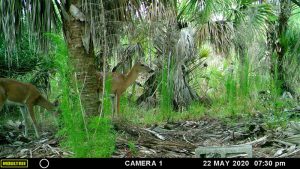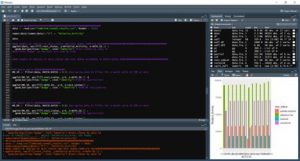From learning about the Great Barrier Reef in high school to admiring lizards in the front yard as a kid, Jazmyn Broxton and Mariaguadalupe Vilchez, wildlife, ecology and conservation (WEC) students, knew they had a passion for the environment. When presented with an opportunity to have a hands-on learning experience to learn more about research projects in ecology, the two students jumped at the chance.
Broxton and Vilchez are currently in their first year of the Doris Duke Conservation Scholars Program (DDCSP). DDCSP is a two-year conservation training program with a focus on enhancing diversity, equity and inclusion in the field of conservation. It does so by pairing undergraduate students with graduate mentors from their schools with the goal of building a community of support and guidance for minority students.
Vilchez is a first-generation student and a Latina pursuing a career in science, technology, engineering and mathematics (STEM). Growing up she did not see a lot of representation of Latinas in the field of conservation and became interested in ecology after her experience as an intern, while in high school, in a coastal fisheries ecology lab at Florida International University.
“I believed the DDCSP could widen my opportunities and provide me with the skills necessary to use my platform in a way that is encouraging and welcoming while also advocating for students in a similar position as me, a minority, in their respective fields trying to pave the way for future generations to be represented,” Vilchez said.
Broxton took a geography class her freshman year of high school where her teacher shared a few images of the Great Barrier Reef.
“I had never seen the Great Barrier Reef, but when I saw the image it was like I was spellbound,” Broxton said.
Three years later, as Broxton was exploring college options, there was only one place that had ecology as a major.
“I looked into it [University of Florida, Department of Wildlife, Ecology and Conservation], and the rest is history,” Broxton said.
From learning about the Great Barrier Reef in high school to admiring lizards in the front yard as a child, Jazmyn Broxton and Mariaguadalupe Vilchez, wildlife, ecology and conservation (WEC) students, knew they had a passion for the environment. When presented with an opportunity to have a hands-on learning experience to learn more about research projects in ecology, these two students jumped at the chance.
Broxton and Vilchez are currently in their first year of the Doris Duke Conservation Scholars Program (DDCSP). DDCSP is a two-year conservation training program with a focus on enhancing diversity, equity and inclusion in the field of conservation. It does so by pairing undergraduate students with graduate mentors from their schools with the goal of building a community of support and guidance for minority students.
Vilchez is a first-generation student and a Latina pursuing a career in science, technology, engineering and mathematics (STEM). Growing up she did not see a lot of representation of Latinas in the field of conservation and became interested in ecology after her experience as an intern, while in high school, in a coastal fisheries ecology lab at Florida International University.
“I believed the DDCSP could widen my opportunities and provide me with the skills necessary to use my platform in a way that is encouraging and welcoming while also advocating for students in a similar position as me, a minority, in their respective fields trying to pave the way for future generations to be represented,” Vilchez said.
Broxton took a geography class her freshman year of high school where her teacher shared a few images of the Great Barrier Reef.
“I had never seen the Great Barrier Reef, but when I saw the image it was like I was spellbound,” Broxton said.
Three years later, as Broxton was exploring college options, there was only one place that had ecology as a major.
“I looked into it [University of Florida, Department of Wildlife, Ecology and Conservation], and the rest is history,” Broxton said.
During the summer of 2020, the students had meetings with the entire collaborative, school specific meetings and then lab meetings. Students would discuss how diversity and culture play a role in wildlife topics. The Assistant Dean of Community and Inclusion at the Yale School of Forestry and Environmental Studies, Thomas Easley, would lead discussions focusing on his experiences in ecology. The UF cohort would talk about graduate school, research and job opportunities.
Broxton and Vilchez work with Laura Nicholson, a master student in WEC, on pieces of Nicholson’s master’s research, which focuses on habitat preferences of varying bat species. Over the summer, students worked with their graduate student mentor to develop a research project that will be presented at the Ecological Society of America meeting during the summer of 2021.
“The people you work with can make or break an experience and this year’s cohort are all amazing people,” Broxton said. “We meet on Zoom, but rather than having problems with getting people to volunteer to speak, we find ourselves trying not to talk over each other and give each other time to finish before jumping in. I have a big smile on my face now just thinking about it.”

Due to COVID-19, Broxton and Vilchez’s experiences were a bit different from past participants, as the two students were unable to participate in fieldwork with their graduate student mentors. Broxton and Vilchez worked with previously collected data and formed research questions to create their research projects. Vilchez focused on the game camera portion of Nicholson’s research, and Broxton focused on the bat acoustics.
“I enjoyed every step of the way, from getting to develop my research questions to organizing the data, and finally getting to analyze it has been very rewarding, especially when receiving the support and guidance from my cohort and graduate student mentors,” Vilchez said.

Broxton plans to graduate during the fall of 2021 and although she is still thinking about her future goals, she would like to be involved in habitat restoration or climate change work.
“I enjoy learning about shifts species’ ranges and population dynamic changes,” Boxton said. “Hopefully, no matter what it is I can work with data.”
Vilchez is currently in her second year as an undergraduate student and plans to graduate in the spring of 2023. She hopes to jump straight into graduate school to pursue a Ph.D. in ecology.
“I take a lot of pride in being a south Floridian and I am obsessed with the Everglades,” Vilchez said. “I plan to work with ecosystems and restoration efforts, specifically with a focus on invasion ecology and coastal fisheries ecology to provide my home with the best of its resources and hopefully inspire others to keep fighting the good fight for the Everglades.”
For students who are interested in applying, applications are currently open. The general deadline is Feb. 15, 2020, and applications will be evaluated as they are received.
“The Doris Duke Conservation Scholars Program has shaped me to become the best version of myself and has given me so much opportunity beyond what it entails and I highly recommend if anyone is just a bit inclined to apply — go for it!,” Vilchez said.
For more information about the program visit the DDCSP website.
 0
0
